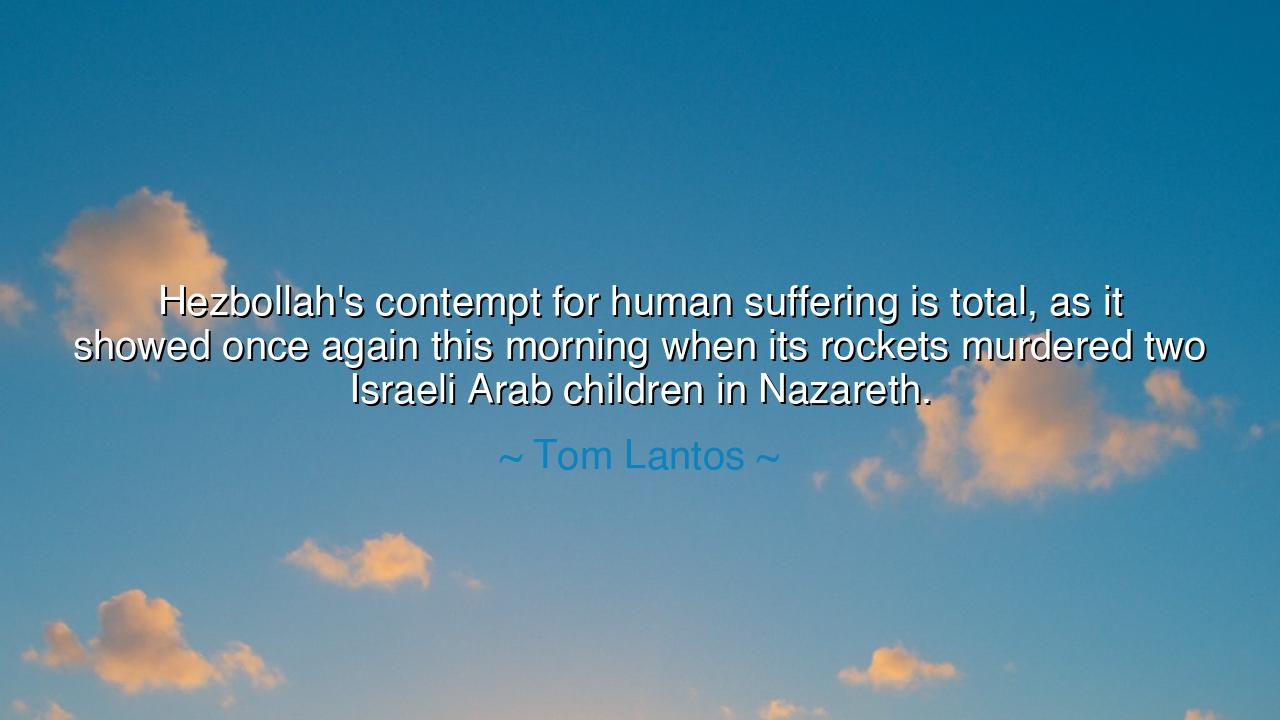
Hezbollah's contempt for human suffering is total, as it showed
Hezbollah's contempt for human suffering is total, as it showed once again this morning when its rockets murdered two Israeli Arab children in Nazareth.






"Hezbollah's contempt for human suffering is total, as it showed once again this morning when its rockets murdered two Israeli Arab children in Nazareth." These words, spoken by Tom Lantos, paint a chilling portrait of the brutality and indifference to human life that defines certain acts of violence. Lantos' statement highlights the indiscriminate nature of conflict, where human suffering is often viewed with callous disregard by those who perpetuate violence. This specific reference to the tragic deaths of two Israeli Arab children underlines the cruelty and inhumanity that accompanies acts of terrorism, where innocent lives are sacrificed for causes far removed from their understanding.
In the ancient world, the concept of honor and duty to one’s people was central to many cultures, and the idea of sparing the innocent was held in high regard. Homer's Iliad, for example, is filled with references to the respect for life, even amidst the most horrific of wars. Despite the endless battles and bloodshed, there is a marked difference between those who engage in combat with honor and those who disregard the sanctity of life. The ancient Greek heroic code required warriors to fight bravely and honorably, but it also required them to show mercy and avoid harming non-combatants, recognizing that war should not extend to those unconnected to the conflict. The cruelty displayed by groups like Hezbollah is the antithesis of this ancient value, for they show no such respect for life, instead viewing innocent civilians as mere collateral damage.
Consider the tragic tale of Cassandra, the daughter of King Priam in the Iliad. Cassandra was cursed with the gift of prophecy, but her warnings were ignored, and the violence of war consumed her people. The destruction wrought by aggression was indiscriminate, destroying lives regardless of innocence. This ancient story reflects the timeless reality of warfare: violence breeds destruction, and innocent lives are often caught in the crossfire. In the modern world, as seen in the tragic deaths of these children, that ancient cycle of violence continues, showing that despite the lessons of history, the horrors of war still harm the most vulnerable among us.
In the context of modern-day conflicts, we see this contempt for life manifest in the actions of groups that, like Hezbollah, use violence to advance their political or ideological agendas. Their indifference to the suffering of innocent civilians—whether Israeli or Palestinian, whether child or adult—demonstrates the dehumanization that occurs when individuals are seen not as people with hopes, dreams, and families, but merely as obstacles to a goal. This callousness not only perpetuates suffering but also deepens the divisions between peoples, making it harder to reach any form of peace. The death of innocent children, as Lantos points out, is not just a tragedy in the moment but a wound that echoes through generations.
This is where Lantos' words carry a deeper truth: contempt for human suffering has been a driving force behind much of the violence in human history. It is the refusal to recognize the value of life—of every life—that fuels the endless cycle of violence. In modern conflict, as in the ancient world, the human soul is often torn apart not by the grand ideas of war, but by the individual tragedies suffered by innocent people. Just as the Greeks and Romans, despite their conquests, had laws protecting non-combatants, so too should we work toward a world where the suffering of the innocent is respected and protected.
The lesson here is profound: compassion and empathy for the suffering of others must be at the heart of any moral framework. Lantos’ words challenge us to stand against those who dehumanize others for political gain, to protect the most vulnerable from the ravages of war, and to cultivate a world where violence is not the first response to disagreement. In the ancient wisdom of Confucius, the Golden Rule is central: "Do unto others as you would have them do unto you." If we are to honor the sacredness of life, we must reject the callousness of violence and instead foster understanding, respect, and compassion for those whose lives are often sacrificed for the sake of ideology.
In our own lives, let us seek to uphold this wisdom. Work toward peace by recognizing the humanity in everyone, regardless of their background, nationality, or beliefs. We must challenge the forces that seek to dehumanize others, whether through violence, prejudice, or hatred, and instead advocate for a world where the value of human life is sacred. Whether through direct action or the quiet choices we make in our communities, we have the power to create a future where the contempt for suffering is replaced by a deep, abiding respect for the lives of all.






AAdministratorAdministrator
Welcome, honored guests. Please leave a comment, we will respond soon